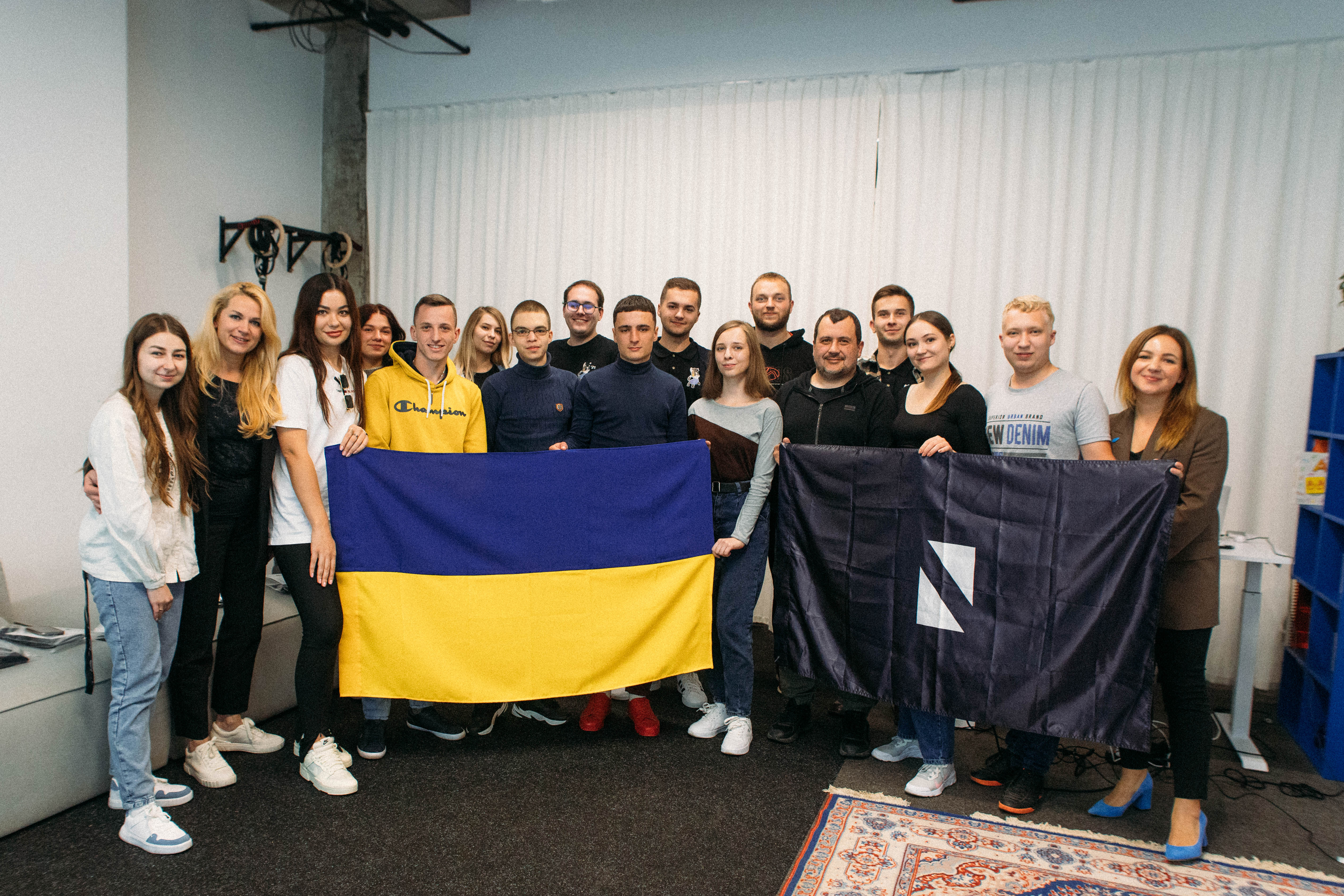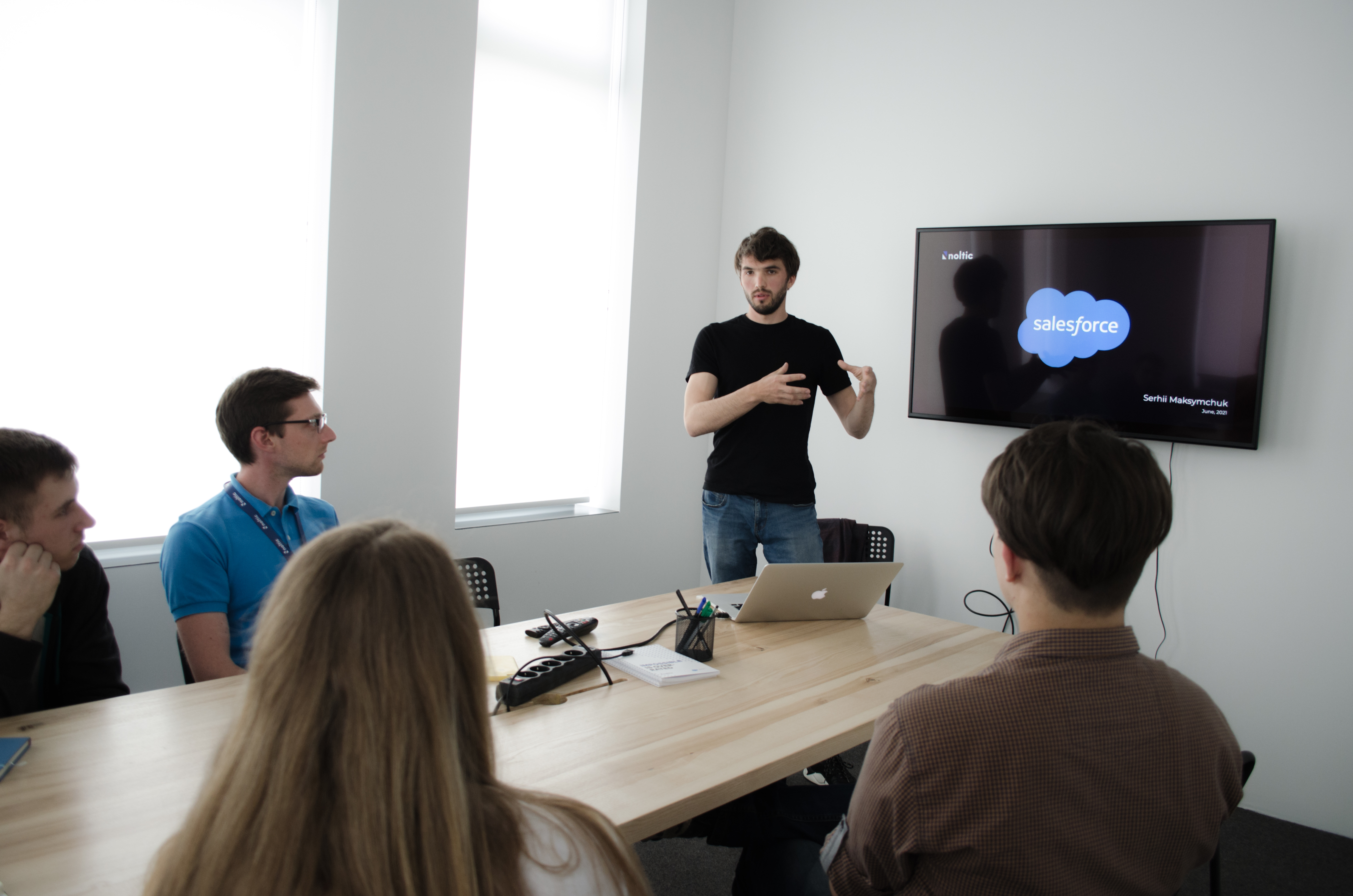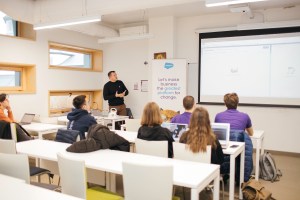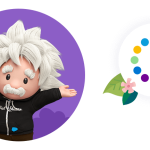Noltic, a Consulting and ISV Partner, was founded by three partners who had the idea of creating a 100% Salesforce-focused agency. The company started focusing on Salesforce learning courses in 2020 to find new hires, close the talent pool gap, and grow the Salesforce Ecosystem inside Ukraine.
In 2022, despite the full-scale war, the team kept funding programs for those who want to start their Salesforce career and now has one of the strongest Salesforce tech teams in Ukraine.
In the most recent 2022 course, Noltic selected 55 students out of 250 applicants. 20 of them successfully completed the course, 10 joined Noltic and 8 others were hired by other companies in the Salesforce Ecosystem. Two of these Trailblazers are Serhii Dvorak, who had previously worked in the aviation industry for eight years, and Viktoria Pelykh, who at 17 became the youngest talent Noltic has ever hired.
These are their stories.

Why did you decide to participate in the Noltic program?
Serhii: I worked in the aviation industry for eight years, but had always been interested in switching to tech. I signed up for a course, drawn to the fact that Salesforce seemed suitable for beginners without a programming background. I liked the fact that there are lots of free study materials on Trailhead, and clear progression paths that take you from basic admin skills to being a developer, which was my goal.
However, after this first course, I was unsuccessful in a few interviews so decided to learn more. I’d already taught myself Java and JavaScript but the Noltic Salesforce course was a game-changer for me. During those three months, I gained job-ready skills and, by the last stage of the program, I received a Trainee Salesforce Developer job offer at Customertimes.
Viktoria: I was just 17, and a fresher at Poltava Technical University studying Computer Science, when I was invited to an open lecture from one of Noltic’s Salesforce Certified Architects. The University partners with Noltic, and I was inspired to learn more about Salesforce and gain hands-on experience that would enrich my student life. I applied for the course and was accepted!
What was the course like?
Serhii: I loved the blended form of lectures led by senior experts together with independent study. We had a list of Trailhead tasks and practical homework after every class, and I studied for around 10 hours a week in total. We also had access to a Slack channel, where we could ask questions and receive answers anytime and, during the final project, 1:1 mentorship with Salesforce Architects which was extremely beneficial. They also invited inspiring international speakers who helped me understand the bigger picture of Salesforce’s industry.
Viktoria: I took part in the course in 2021 during Covid so most of the lectures were online, although there were still offline meet-ups to work on practical tasks with mentors. I dedicated a lot of time to the course but was able to combine it with full-time studies at university.
What do you like about Salesforce?
Serhii: I love the diversity of tasks you can do with Salesforce technology – it’s not just about coding. Every successful expert needs to know how to think outside of the box and find creative ways to build very complex tech solutions. It’s tricky and challenging, which I like.
Viktoria: I like the community, business philosophy, and values. In just the first year of my career, I’ve finished the course, met people from Salesforce across the US and Europe, attended the Salesforce World Tour in Warsaw and delivered tech solutions for two projects. There’s always something going on in the Salesforce Ecosystem – wow!
How much time did you need to find a job and how did the job hunt go?
Serhii: It took me around six weeks. I started job hunting before the course ended and was surprised to receive an offer after only two interviews. I didn’t accept it due to location, but I was happy to prove to myself that my expertise counted. A few weeks later, I found Customertimes which perfectly matched my preferences.
Viktoria: I don’t have any experience looking for a job! I was young when I started the course and, after successfully completing the program as their top student, Noltic invited me to join as an intern. Eventually, they offered me a full-time position when I turned 18 and I’ve been here for a year. Lucky me!
How well did the course meet your expectations in terms of job opportunities?
Serhii: It exceeded my expectations. The curriculum is practical and employment-focused. Even the participant selection process is useful – you learn how to complete test tasks and hold a conversation during an interview.
Viktoria: It gave me more than I expected and I am happy to have all these opportunities now. I received a job offer at Noltic right after the course, so I can keep on growing my expertise.
What is your job like? Are soft skills important?
Serhii: I’m currently finishing my trainee program, setting up pages and security processes, writing Apex code, HTML and JavaScript, and helping develop apps. I think soft skills are a must. They define your work approach and the ability to collaborate and communicate with others. Salesforce really emphasizes soft skills development. At the course graduation party, Alexandra Klein, Talent Ecosystem Program Manager, gave us an awesome inspirational speech about the importance of “Thank you” in the Salesforce culture. It’s a good example of how soft skills count.
Viktoria: I’m learning new technologies and implementing tech solutions to make people’s lives easier. The very first client I worked for was Nova Ukraine – one of the biggest Ukraine-focused nonprofits in the US – helping automate their fundraising and issuing grants processes. We imported all donors’ information into Salesforce and integrated different systems such as crowdfunding platforms. Honestly, I wouldn’t believe that an 18-year-old girl could do such a meaningful project using beginner skills in software development!
What is it like working in the Salesforce Ecosystem?
Serhii: Salesforce is ideal for people who enjoy tackling tricky tasks. It’s a big world with many connected dots so there’s always something to learn, whether you want to focus on business operations, coding, culture, or anything else.
Viktoria: It’s like being part of a professional team, with ongoing development and engaging projects. If you like learning new technologies and want to improve business processes, it’s for you. It’s also for people who are ambitious and cheerful – because those are the type of people you’ll work with within the Salesforce Ohana.

Visit Noltic’s website or contact the Talent Ecosystem Team to find out more about workforce development partnerships.
The Salesforce Talent Ecosystem team collaborates with workforce development partners to change people’s lives and give them rewarding careers in the IT sector. If you would like to know more about our initiatives, whether you are an interested student or our new potential partner, feel free to visit our website or join LinkedIn group and get in touch with us.





















